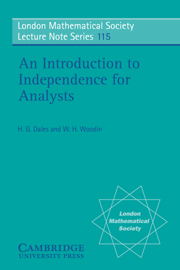2 - Partial orders, Boolean algebras, and ultraproducts
Published online by Cambridge University Press: 18 March 2010
Summary
Our approach to forcing will use “Boolean-valued universes”, a method which originates with Scott and Solovay (see the notes to Chapter 7). It is therefore necessary for us to present some basic facts about Boolean algebras; we shall prove only the results that we shall require later. In fact, our discussion will be carried out in the more general context of partially ordered sets. In Example 2.2(vi) we shall describe examples of partially ordered sets which will be very prominent in later chapters.
In this chapter, we shall introduce the completion and the Stone space of a Boolean algebra B. The latter is the set of ultrafilters on B, and we shall recognize βK as the Stone space of the Boolean algebra P(N). This allows us to reformulate our basic question as a question about where U is a free ultrafilter on N.
We shall conclude the chapter by discussing the P-points of the compact space βN/N.
DEFINITION
Let P be a non-empty set. A strict partial order on P is a binary relation < such that:
(i) if a < b and b < c in P, then a < c;
(ii) a a for each a ε P.
A total order on P is a strict partial order < such that:
(iii) for each a, b ε P, either a < b or a = b or b < a.
A partially ordered set is a pair P = (P, <), where P is a non-empty set and < is a strict partial order on P.
- Type
- Chapter
- Information
- An Introduction to Independence for Analysts , pp. 22 - 42Publisher: Cambridge University PressPrint publication year: 1987



